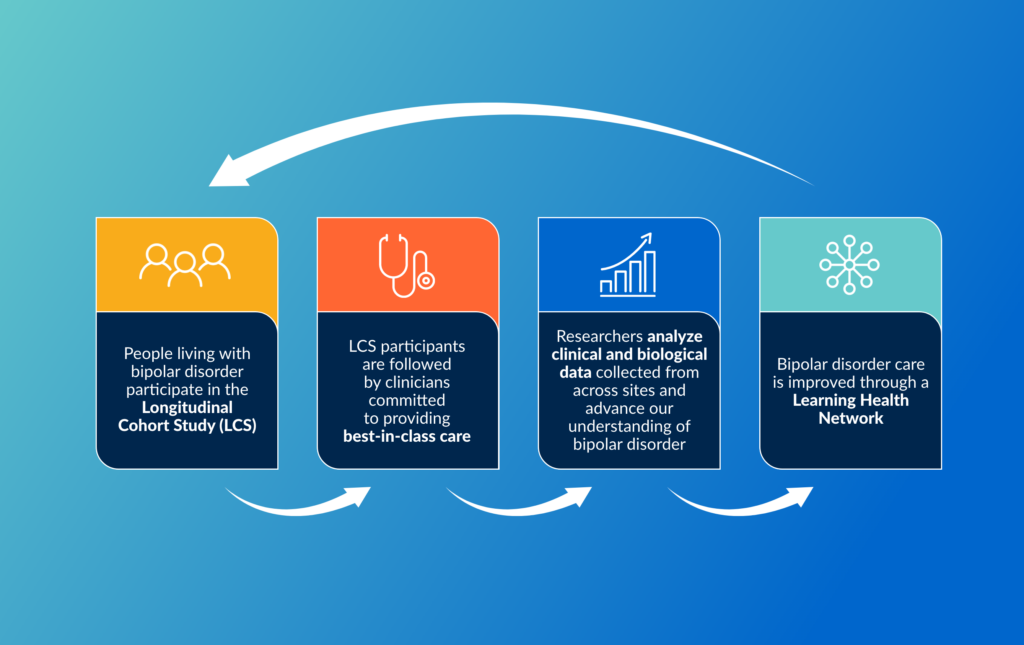BD² Integrated Network
A collaborative model that will improve care, interventions,
and outcomes for people with bipolar disorder.

Our approach combines the power of discovery with accelerated translation of findings to care by generating data collected in real-world clinical settings alongside a comprehensive longitudinal research study.
The Model
Recognizing an urgent need to drive progress in bipolar disorder research and care, BD² is bringing together an unprecedented depth of information from people with bipolar disorder to effectively lift the ceiling on current scientific understanding, create new treatment options, and drive a path towards wellness.
Explore BD² Sites & Partners
Our Network

By learning more about participants’ daily lives and connecting them with clinicians and researchers who share data across sites, we are accelerating what we can learn about the biology of bipolar disorder, determining biologically defined subtypes, and providing a scientific basis for new, targeted treatments. Our clinical sites comprise 11 institutions with proven track records of excellence in bipolar disorder treatment.

Study Design
Our model interweaves a longitudinal cohort study, engaging people with bipolar disorder and their caregivers with a learning health network. The result is an unprecedented system that supports continual advancement in the understanding of bipolar disorder along with improvements in care.
Our Approach
The BD² Integrated Network works to improve the health and well-being of people living with bipolar disorder by engaging a network of collaborating investigators and clinicians to:
- implement and inform data-driven improvements in care
- build an unprecedented data ecosystem comprised of longitudinal clinical and biological data
- generate novel insights that will drive innovative approaches to bipolar disorder interventions and treatments
Project Outcomes
Today, it is estimated that it takes an average of 17 years to translate a scientific discovery to meaningful interventions for people with bipolar disorder.
The BD² Integrated Network aims to collapse that timeline so individuals participating in the network can benefit from better care, today. And more broadly, the network will be able to develop improved care guidelines for all.
Who’s Involved
The network consolidates the expertise of bipolar disorder clinicians and researchers into a collaborative initiative that will advance clinical care and lead to better outcomes for those living with bipolar disorder.
Each site has the capacity for significant participant enrollment in the longitudinal study and demonstrates a commitment to BD²’s mission of equitable healthcare and meaningful ethnic and racial representation in clinical trials and research studies alongside proven track records of contribution to multi-site initiatives and longitudinal studies.
-
Johns Hopkins University



-
Mass General Brigham-McLean


 Robert Gonzalez, MDClinical Lead
Robert Gonzalez, MDClinical Lead -
Mayo Clinic



-
Ottawa Hospital Research Institute



-
The Feinstein Institutes for Medical Research



-
The University of Texas at Austin



-
The University of Texas Health Science Center at Houston


-
University of California Los Angeles



-
University of California San Diego



-
University of Cincinnati/Lindner Center of HOPE





-
University of Michigan




Key Partners
BD² has partnered with institutions and companies that bring together data, samples, processes, and analysis for the Integrated Network. Their tools and expertise are essential to a functional model.
-
Centralized Biosample Repository - Mayo Clinic Biobank
The centralized biosample repository will provide the infrastructure for standardized sample collection, handling, additional testing, and data dissemination. The Mayo Clinic Biobank will facilitate biosample protocols and conduct DNA isolation to create standard data and aid genome sequencing.

 Jordan WeyerMayo Clinic
Jordan WeyerMayo Clinic -
Clinical Coordinating Center - The Feinstein Institutes for Medical Research
The Clinical Coordinating Center will help to improve bipolar care protocols across the field. The Feinstein Institutes for Medical Research will coordinate with our partner sites and the Data Coordinating Center to ensure the standardization of clinical assessments across sites. These assessments will provide our network with ongoing insight into the individual differences in bipolar disorder in over 4,000 participants across up to 15 clinical sites over the next decade.


-
Data Coordinating Center - Indoc Research
The Data Coordinating Center will provide the BD2 Integrated Network with the environments, tools, and processes necessary to maximize the utility of standardized data collected by the participating sites, enabling data aggregation, curation, sharing, and analysis. Indoc’s track record of multi-site coordination positions the network for unprecedented data access and analysis. The centralized approach will power greater scientific understanding of trends and patterns that contribute to the complexity of bipolar disorder and lead to breakthroughs in treatment and care.

-
Peer Support Provider - Depression and Bipolar Support Alliance (DBSA)
DBSA will provide peer support, a sense of community, and wellness tools as part of long-term involvement in the study. These tools are designed to foster community, improve health outcomes, and provide valuable data-driven insight into best practices for supporting holistic wellness so that people living with bipolar disorder are empowered to thrive. DBSA will facilitate connection and interaction with study participants through peer support sessions and information, cultivating encouragement and hope throughout the duration of the study.



Explore Our Work
Learn how BD² will close a fundamental gap in understanding the genetic and biological mechanisms of bipolar disorder.


